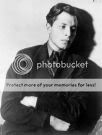Delmore Schwartz and Lou Reed
 To understand Lou Reed you could begin where he began: the works of American poet and author Delmore Schwartz and the novels of proto-grunge writer Hubert Selby jnr, author of Last Exit To Brooklyn and Requiem For A Dream.
To understand Lou Reed you could begin where he began: the works of American poet and author Delmore Schwartz and the novels of proto-grunge writer Hubert Selby jnr, author of Last Exit To Brooklyn and Requiem For A Dream.
In 1962, Delmore Schwartz began teaching creative writing at Syracuse University. One of his students was future songwriter Lou Reed (Take A Walk On The Wild Side), who dedicated several songs to his mentor (European Son). Schwartz told Reed at one point, “You can write-and if you ever sell out, and there’s a heaven from which you can be haunted, I will haunt you.” Reed never forgot this. He attended Schwartz’s funeral in 1966, and years later in his song, “My House”, Reed tells the story of a ghost in his new home who spells D-E-L-M-O-R-E on an Ouija board, and who doesn’t spook him, but instead inspires him.

By the time the Lou Reed met Delmore Schwartz at Syracuse University in the early 1960s, Schwartz was in the last years of his life and showing the effects of alcohol and drug abuse. He befriended the young English student, encouraging him to write naturally. A story of his that left its lasting mark via his early book, In Dreams Begin Responsibilities. Reed was to say later: “I read that in college and it changed my life forever. One of the greatest short stories ever written, five pages and not one polysyllabic word.”
At the same time Reed was developing a strong response to the realism of Selby’s portrayals of the hookers, hop-heads, and the damaged war veterans in America. These weren’t imagined people, no matter what shocked critics and the comfortable middle class said. The effect was immense on Reed, who in his teens had been subjected to electroconvulsive therapy, ordered by his parents, who were disturbed by his developing homosexuality.
Welsh avant-garde musician John Cale, who met Reed at Pickwick where their almost instant bond led them to form the Velvet Underground. Suffering and degradation had long been staples of the blues, but it was rare in pop and rock. In the late ’60s, when the Velvets first played in San Francisco, their grimy, sometimes vicious tales were in sharp opposition to the hippie scene developing there and in London. Reed was aligned with the glam rock scene, hanging out with David Bowie, who produced his most successful solo album, Transformer.
Lou Reed and The Velvet Underground – Sweet Jane

Comments
Delmore Schwartz and Lou Reed — No Comments
HTML tags allowed in your comment: <a href="" title=""> <abbr title=""> <acronym title=""> <b> <blockquote cite=""> <cite> <code> <del datetime=""> <em> <i> <q cite=""> <s> <strike> <strong>